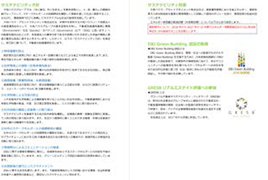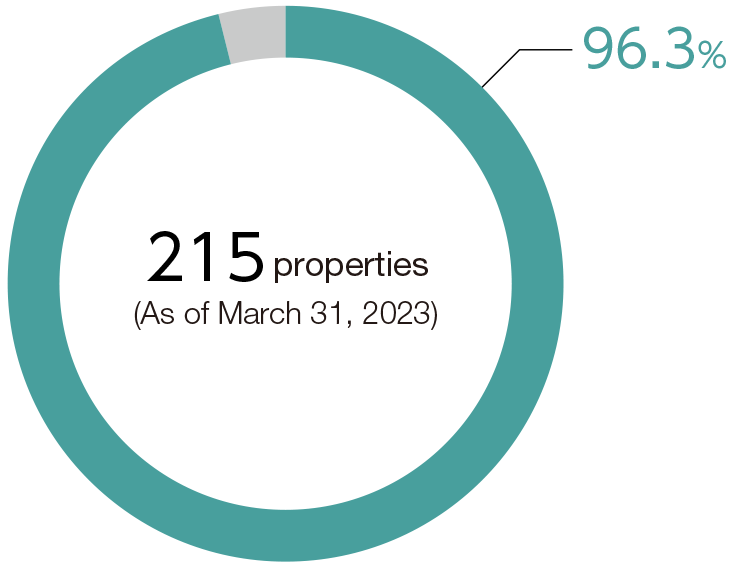Tenant Engagement Programs
DHR and the Asset Manager promote sustainability initiatives in cooperation with tenants of its properties. By distributing a sustainability guide that summarizes information such as the Sustainability Policy of the Asset Manager and environmental certifications to tenants and posting it at the properties, we share the social issues with the tenants and promote initiatives.
At some properties for which a green lease agreement has been concluded, DHR regularly confers with tenants in the aim of sharing environmental information and reduction targets.

Initiatives to Increase Tenant Satisfaction
DHR regularly conducts surveys to grasp tenants’ needs and satisfaction in the belief that increasing tenant satisfaction leads to stable and improved property-operating performance.In a questionnaire given to the residents of 119 residential properties (8,386 units) through a third-party organization in February 2022, around 71% of tenants gave their property a “7” or higher out of an evaluation scale up to 11 overall, and around 62% of tenants gave their property a “7” or higher as to whether they would recommend the property to others.
The questionnaire results are shared with property management companies and used to improve building and facility specifications and services.
Supply Chain Management
Daiwa House Group conducts business with the belief that its suppliers are important business partners. Daiwa House Group believes that we can provide quality that satisfies our customers by forming an extensive supply chain that includes manufacturers of material and equipment, construction, and after-sale services.
The requirements of institutional investors and NGOs for companies to engage in environmental and social initiatives have expanded to include not only the company and corporate group but also supply chain management. Even in international rules and stock exchange guidelines, the requirements for group CSR procurement initiatives and informational disclosure are becoming even stricter. The era the world is entering demands satisfying both social factors such as human rights considerations and expectations for quality and price to be competitive.
Daiwa House Group strives to realize a sustainable society through the promotion of CSR procurement together with its suppliers.
Supply Chain Sustainability Guidelines
Our Supply Chain Sustainability Guidelines set forth seven social and environmental principles via a “Business Partner Code of Conduct.” And, based on this code of conduct, our “Corporate Activity Guidelines” elucidate 42 specific social and environmental items.
The “business activities based on high ethical standards” requirement in the “Business Partner Code of Conduct” stipulates that business partners are expected to act ethically and in full compliance with laws and regulations.
Where the code of conduct requires “considerations for occupational safety and health,” business partners are expected to concern themselves about health and safety, by preventing industrial accidents, assiduously managing sanitation and hygiene, and being prepared for unforeseeable events like natural disasters.Our section on “fair business activities” requires our business partners to take anti-corruption measures in order to keep business free of graft and corruption.And, the section on “respecting human rights” outright disavows forced labor, child labor, harassment and infringements of human rights by way of discrimination, etc.
The Asset Manager requires its property management companies to implement the Supply Chain Sustainability Guidelines, which is reflected in the annual assessment of Property management companies.
For details on the Supply Chain Sustainability Guidelines, follow this link.
Cooperation with Property Management Companies
The Asset Manager conducts evaluations of property management companies once a year to determine whether the ongoing outsourcing of operations to the current property management companies is appropriate based on the internal operations manual, including automatic contract renewals. We provide feedback on the results of these property management company assessments to them and guide corrective actions for any items requiring improvement. These property management companies submit reports on the corrective actions for any items presenting a major problem.
Additionally, DHR determines whether to change property management companies if a property management company continues to have a low evaluation on the assessments and no corrective actions can be expected.
Content of the Property Management Company Assessment
(1) Financial results and conditions as well as other management information
(2) Organizational structure
(3) Facility operation management and technical management capabilities
(4) Tenant leasing skills
(5) Reasonable compensation standards for the property management operations
(6) Performance of application and area management
(7) Sustainability
Sustainability Survey for Property Management Companies from the Asset Manager
(1) Introduction of an environmental management system or equivalent initiatives
(2) Promotion of green procurement for subcontractors
(3) Occupational health and safety
(4) Health and comfort
(5) Respect for human rights and diversity
(6) Corporate ethics
(7) Community involvement
(8) Environmental and health-conscious products
(9) Cooperation with our sustainable procurement (including re-consigned subcontractors)
Introduction of Green Leases
Green Lease Agreements
Aiming to improve the environmental performance of properties through a collaborative effort with tenants, DHR is promoting the introduction of green leases.In a green lease agreement, the building owner and the tenants jointly cooperate by proactively entering into agreements and memorandums of understanding regarding the reduction of the environmental burden of the property, such as through energy savings, and improvement of the workplace environment, and by putting the details of these undertakings into practice.
*1 The information shown is based on the status of agreements as of March 31, 2023.
*2 Agreement conclusion percentage = Total floor area of properties for which a green lease agreement has been concluded/Total floor area of the entire portfolio (excluding land properties)
*3 Total floor area is based on the floor area provided on the inspection certificate of each property.
*4 The agreement conclusion percentage is rounded to the first decimal place.

Supplier-related Violations and Accidents
There were neither significant supplier-related violations nor accidents at DHR’s properties that would affect stakeholders. (Fiscal year ended March 2023)
